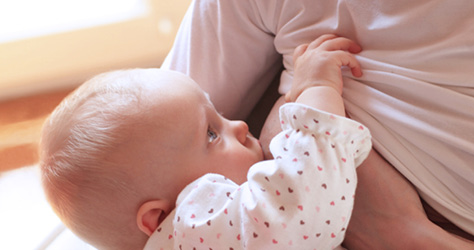Can you drink alcohol while breastfeeding, how can you tell if your baby’s hungry and the delicate subject of poo...
Here are some questions about feeding your baby answered.
At a glance
- It’s important they don’t ‘snack feed’ every 30 minutes or so
- You’ll notice your baby will need more feeds during a growth spurt
- Everything we eat while breastfeeding can have an effect on our baby

How often should I feed my baby?
As often as they want it – as the more they feed the more your breasts produce. Frequent feeding is the key to building up a good milk supply. After the first week, most babies feed eight times a day or more. But make sure they are latched on correctly and haven’t just got your nipple in their mouths, because they won’t get the nourishment they need and it may hurt you.
It’s important they don’t ‘snack feed’ every 30 minutes or so: not only will it get sore for you, but the longer they feed at one sitting, the richer the milk becomes. This ensures a more effective feed and the richer milk contains a lot more fat than the milk at the beginning of the feed which quenches their thirst. So it’s this that will help them keep going longer between feeds. Try to make sure they empty at least one breast at a feed so you can be sure they’ve got plenty of richer milk. They probably won’t be able to empty the second.
If they’re falling asleep during a feed, try singing, chatting and gently tickling them to keep them awake and sucking. But sometimes, whatever you try, they can’t be stirred so it’s best just to put them down to sleep and try again later. Don’t worry – as they get older their feeding gets much faster and more efficient. It won’t always be like this.
You’ll notice your baby will need more feeds during a growth spurt. These typically happen at 6-8 weeks, three months and six months – although each baby is slightly different.
How do I know when they’re hungry?
'Responsive feeding' (also called 'baby-led' or 'on demand') is the best way to nourish your baby. But that doesn’t necessarily mean feeding them every time they cry, as a baby cries for all sorts of reasons (if only we could understand what each one means!) They might be cold, hot, bored, over-stimulated, over-tired – any number of things.
Experts say if you look carefully at your baby when they cry in the early days you’ll probably be able to pick up their hunger signals.
- In the first four months they may ‘root’, turning their head and opening their mouth at the same time
- In the first eight weeks stuffing their hands in their mouths or sucking clothes is a frequent sign (after eight weeks they have more control over their hands so it doesn’t always mean they’re hungry)
- They may open their mouth, make sucking noises or smack or lick their lips
- They might fret, fidget and breathe more quickly
- If they’re really hungry they will cry loudly, often thrashing their head from side to side.
What foods should I avoid when breastfeeding?
Some mums swear that strongly flavoured vegetables like broccoli, onions, Brussels sprouts and cabbage give their babies wind. Tomatoes and other acidic foods are also sometimes blamed for a windy and unsettled baby. There’s not much research to back this up, but if you suspect these foods might be the reason your baby is unsettled, try cutting them out for a week and see what happens. Make sure you get your fibre and vitamins from other sources, though.
Can I drink alcohol while breastfeeding?
Everything we eat while breastfeeding can have an effect on our baby. There’s no official advice not to drink alcohol, but the NHS advises that moderation is the key. Research shows that 1-2 units once or twice a week won’t harm your baby (a unit is half a pint of beer or a very small 125ml glass of wine). But more than that can affect the ‘let down reflex’.
Alcohol gets into your bloodstream about 30-45 minutes after you’ve drunk it, so if you’d like an occasional drink, perhaps time it for just after a feed. Have some expressed milk on standby for the next feed if you can. Each unit of alcohol takes two hours to clear, so it’s not very wise to drink more than one or two units in one sitting. Your baby may well object to the taste of their milk after even a small amount of alcohol, which is why lots of mums opt for cutting out alcohol altogether during breastfeeding.
What about coffee?
Food containing caffeine – including energy drinks, cola, chocolate and tea, as well as coffee – can keep your baby awake because small amounts of caffeine pased into the breastmilk. This is a problem particularly if you’re having lots of cups a day to stay awake yourself! If this is a problem for your baby, try replacing coffee/energy drinks with juice, water or other caffeine-free soft drinks.
How can my partner get involved when I’m breastfeeding?
There are plenty of ways partners can feel useful. They could wind baby after a feed, change nappies, cuddle them and bath them. Food is only one part of your baby’s life.
Is it normal to poo after every feed?
Yes, especially in the first few weeks. It’s actually a good sign that they’re getting the milk they need. Some babies carry on like this for months; others may begin to poo slightly less frequently after 6-8 weeks. Formula-fed babies tend to poo less often because the milk is harder to digest. Some babies only poo every two or three days – they’re all different. But talk to your health visitor if you’re worried your baby is distressed and uncomfortable and might be constipated.